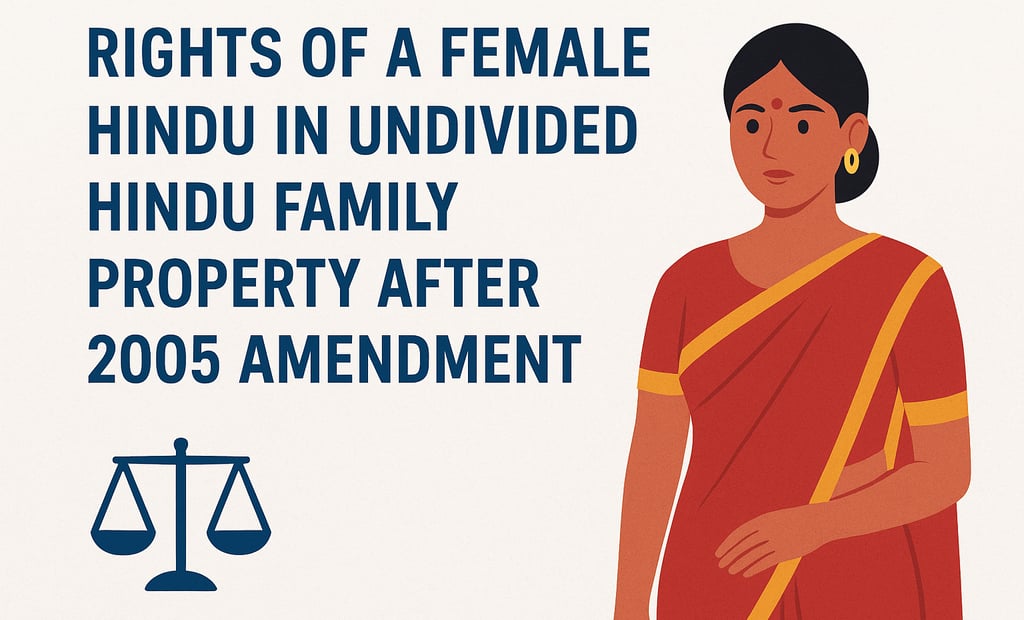Rights of a Female Hindu in Undivided Hindu Family Property After the 2005 Amendment
The Hindu Succession (Amendment) Act, 2005 marked a historic change in Indian family law by granting equal rights to daughters in ancestral property. Before this amendment, daughters were not recognized as coparceners in a Mitakshara Hindu Undivided Family (HUF), meaning they could not demand partition or inherit an equal share in family property. However, from 9th September 2005, the law changed completely. Under Section 6 of the Hindu Succession Act, 1956 (as amended), daughters are now treated at par with sons in matters of inheritance and coparcenary rights.
8/17/20252 min read


The Hindu Succession (Amendment) Act, 2005 marked a historic change in Indian family law by granting equal rights to daughters in ancestral property. Before this amendment, daughters were not recognized as coparceners in a Mitakshara Hindu Undivided Family (HUF), meaning they could not demand partition or inherit an equal share in family property.
However, from 9th September 2005, the law changed completely. Under Section 6 of the Hindu Succession Act, 1956 (as amended), daughters are now treated at par with sons in matters of inheritance and coparcenary rights.
Key Provisions of Section 6 (as amended in 2005)
Daughters as Coparceners by Birth
A daughter of a coparcener becomes a coparcener in her own right just like a son.
She has the same rights and liabilities as a son in the joint family property.
Equal Right in Ancestral Property
A daughter is entitled to the same share as a son in the ancestral property.
She can also demand partition of the joint family property, including the dwelling house.
Rights Not Affected by Marriage
The law applies equally to married and unmarried daughters.
A married daughter also has the right to claim her share if the property is undivided.
Protection of Past Transactions
Any partition, alienation, or transfer of property that took place before 20th December 2004 remains valid and cannot be challenged under this amendment.
Testamentary Rights
A daughter can also dispose of her share by will (testamentary disposition).
Common Issues and Clarifications
1. What is the right of a daughter in coparcenary property after the 2005 amendment?
A daughter now has equal rights as a son. She is a coparcener by birth, with the right to demand partition and inherit her share in the joint family property.
2. Can a married daughter inherit property if partition has not yet taken place?
Yes. Even if a daughter is married, she can claim her rightful share in the ancestral property as long as partition has not already been legally completed.
3. Does the amendment affect partitions done before 2004?
No. The law clearly states that any partition or transfer of property completed before 20th December 2004 will not be reopened.
Key Takeaways for Families
Daughters are now equal stakeholders in ancestral property.
Marriage does not take away the right of a daughter.
Old partitions (before 20th December 2004) remain untouched.
The amendment promotes gender equality and strengthens the position of women in family law.
Sarvaya Law Chambers
Sarvaya Law Chambers is located in Dwarka, Delhi, providing expert legal services in civil, criminal, property, and supreme court matters.
Contact Us
Connect
About
© 2025. All rights reserved.


Home
Service
Contact
Useful Links
Address: Flat No. 565, Sunview Apartments, Pocket-4, Sector-11, Dwarka, New Delhi – 110075
📍
Phone: +91 8178085226
info@sarvayalawchambers.online
Hours: Mon–Sat: 9:00 AM – 10:00 PM | Sun: 10:00 AM – 5:00 PM
📧
📞
🕒
